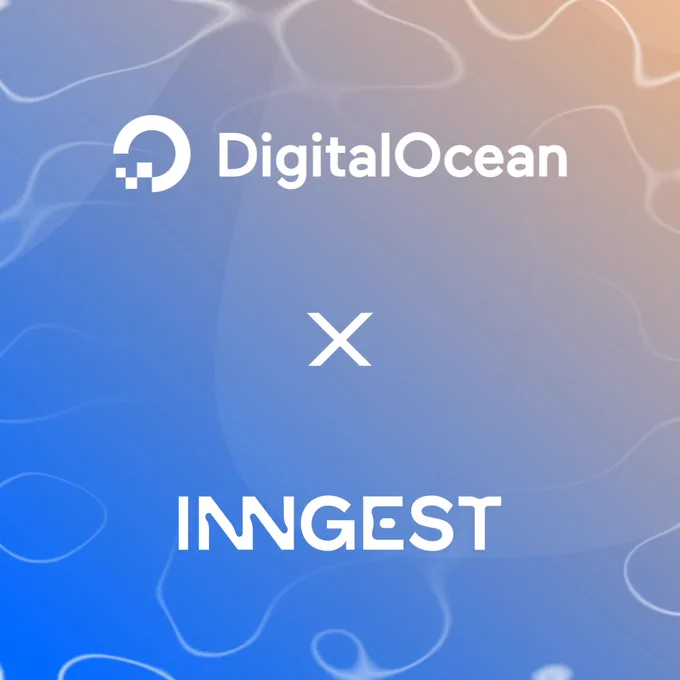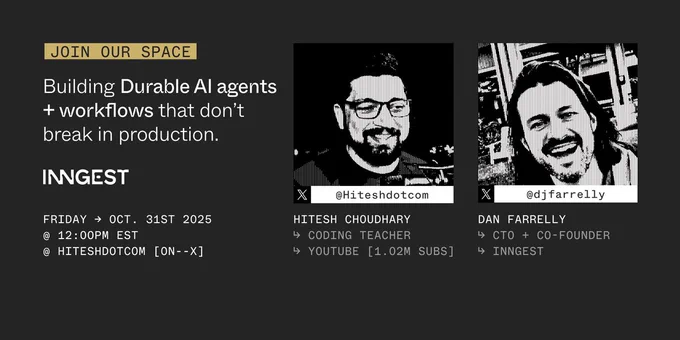Inngest is the developer platform for shipping reliable functions with zero new infrastructure. inngest.com/discord github.com/inngest/inngest
Worldwide
Joined May 2021
- Tweets 921
- Following 112
- Followers 5,025
- Likes 1,684
Big news.
We’re excited to announce our $21m Series A!
Inngest now powers 30B monthly executions, helping product teams build reliable products efficiently, at scale.
As AI moves to production, the need for fast, durable workflows is essential.
Read the announcement post👇
DigitalOcean 🤝 Inngest
Unbreakable workflows meet best-in-class observability. 🤝🔗☁️
@Inngest, a durable workflow orchestration platform, helps developers build scalable products, like AI workflows, agents, & e-commerce stores, without the complexity of managing infrastructure.
Get started now!
Configure the Inngest DevServer MCP with Claude Code or Cursor with a single command ⚡
inngest.com/docs/ai-dev-tool…
Inngest retweeted
AI agent orchestration has the same reliability challenges as any async workflow. How do you handle retries? Manage state? Debug errors?
Join @Hiteshdotcom and I on Fri Oct 31 @ 12pm ET for a live session on the practical side of building durable agents: x.com/Hiteshdotcom
Ever shipped an AI agent that broke the moment it hit production?
same.
That's why @Hiteshdotcom & @djfarrelly are going live to talk about building durable AI agents & workflows that actually survive production.
We're covering: workflow orchestration, error handling, retries, state management & more.
Join us:
🗓️ Friday, October, 31st, 2025 @ 12PM EST
🎙️ Twitter Space on @Hiteshdotcom
Inngest retweeted
As a gluer of code tools and concepts, I generally like taking things I love and finding other ways of implementing/building them.
@convex_dev is a really good technology so I have been toying with other technologies to get a similar feel
@instant_db w/ @inngest does that!
Inngest retweeted
Explicit >>> magic, and the difference between `𝚜𝚝𝚎𝚙.𝚛𝚞𝚗()` and "𝚞𝚜𝚎 𝚠𝚘𝚛𝚔𝚏𝚕𝚘𝚠" is huge.
We shipped implicit IDs when we created the 𝚜𝚝𝚎𝚙.𝚛𝚞𝚗 API in 2022. Switched to explicit APIs within months. Here's why:
→ No magic compilation. What you write is what you run. With directives, what you write *isn't* what you run.
→ Steps = explicit code transactions
→ Steps = easy unit test and mock
→ Steps = far more powerful API (`𝚜𝚝𝚎𝚙.𝚠𝚊𝚒𝚝𝙵𝚘𝚛𝙴𝚟𝚎𝚗𝚝`, `𝚜𝚝𝚎𝚙.𝚒𝚗𝚟𝚘𝚔𝚎`, etc.)
→ Steps = easy change management
→ Steps = language agnostic: switch from TS → Go and pick up where you left off
→ Explicit functions = insanely powerful flow control
→ Explicit functions = fan out
In other words, one compiles your code into routes you never wrote. The other gives you typed functions that do exactly what they say. Here's a deep dive:
Friday rhymes with tutorial 💻
This weekend, learn how to build a conversational AI Agent that can answer questions over millions of rows in real-time.
You’ll walk away understanding:
🧠 How to orchestrate multiple agents working together
⚡ How to stream results live as they’re generated
🧩 How to combine real-time inference with structured data retrieval
inngest.com/blog/building-ag…


















